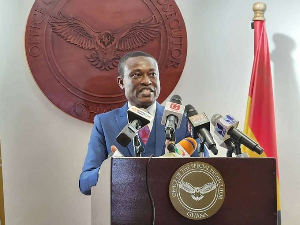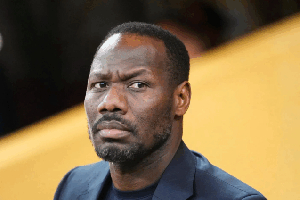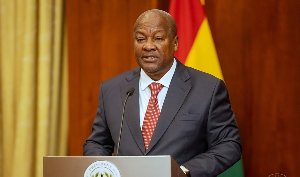Opinions of Wednesday, 8 January 2020
Columnist: Kobby Gomez-Mensah
Ghana’s Akufo-Addo actually deserves over 120% for his performance
I feel obliged to throw my hat into the ring of grading the Akufo-Addo government. I take on this task after carefully observing three other similar ratings, only one of which was based on any meaningful data.
The scores, however, tell on both our expectations and how much we are willing to excuse Ghana’s current administration. The government led by son of a former ceremonial head of state under the Second Republic obviously deserves an A++ rating for turning the West African nation into a new haven where not much seems to be working.
As promised during the electioneering, the government has over achieved if one looks at the many bonus projects not previously promised, including fight against galamsey, lawlessness, wanton dissipation of public funds, impunity and the culture of SUVs with sirens driven by government and party functionaries at all levels united by an unquenchable need to grow their deflated egos.
The above notwithstanding, the government has managed to neutralise dissenting voices within the party, numbed the opposition’s potency to hold it accountable and cowed majority of the media into submission with either gifts or threats.
The fight against galamsey has been won hands down. A trip to any of the water bodies previously cited for the fight, points to decay, if that is a major yardstick for measuring its success. The President’s strong rhetoric three years ago has weakened completely.
Again, if this country was measuring productivity in any significant way, it would wail over the cost of choked roads in nearly every city and its implications for every aspect of our lives. How productive can anyone be if they spend up to three hours commuting to and from work every working day? Many begin thinking about the traffic they have to endure back home after lunch, sometimes resulting in early departures and AWOLs altogether. But there’s no evidence of a desire to change the status quo. All we have is the President’s assurance that there’s money in the country and that any contrary position or opinion is propaganda. Even where there are attempts to improve the traffic situation, the contractors and engineers only succeed in inconveniencing everyone except those with sirens.
With the forgoing in mind, I choose to grade of the current administration in this epistle, focusing mainly on its soft politics. The President is touted as a human rights activist and believer in democracy, who contributed to the repeal of the criminal libel law and saw to the passage of the Right to Information (RTI) Act but has been unable to protect freedom of expression.
A journalist for over 20 years in a conversation last month described this government and some of its functionaries as the most intolerant under the Fourth Republic, even though I’m convinced the early days of the first government of the current republic was also brutal in its dealings with the press. But how does one justify closure of media houses today and intimidation of journalists for doing their lawful duty?
That this government actually oversaw threats against Manasseh Azure resulting in he being whisked to another African country for what can merely be an error in judgment of his journalistic work. His story that a party militia was being trained at the former seat of government in Osu, was met with brutal resistance and forced the anti-corruption crusader into hibernation and has since capitulated to save his life and those of his family. If such an act is not one that contributes to higher grading of a government, I do not know what else could be.
Again, the bar of corruption for the government is set so high that everyone escapes it. Though I called Mahama’s administration a corrupt one, its low bar on corruption saw fellow Legonite Vicky Hammah removed from her deputy ministerial job. Her only crime being, a claim that she wasn’t ready to quit politics if she hadn’t made one million dollars. There was no evidence of siphoning state cash, nor a case of corruption against her, but she lost her job for merely making a claim in a private telephone conversation allegedly leaked by her driver.
However, nearly everyone accused of corruption under Nana Addo’s watch has been cleared and enjoying the booty so gained. From the Bulk Oil Storage and Transport (BOST) contaminated fuel saga to the sale of contracts by the Public Procurement Authority (PPA) boss, to the stinking PDS deal, not a single soul has faced the law for their actions. Though Gifty Klenam, former Ghana Export Promotion Authority boss was pushed out with her deputy, she insisted there was no wrongdoing, despite her job being taken from her. Her deputy shamelessly appears in the media defending government actions including allegations of corruption against others not with a fallen comb.
Again, when the board of the Ghana Cylinder Manufacturing Company accused its CEO of wrongdoing, the Board bore the brunt. It was dissolved and the members have since not been heard challenging their removal because that is how this government does it. Furthermore, architects of the stinking PDS deal have not faced the law because in the eyes of the President, no error has occasioned. The deal was shrouded in secrecy and the full tale may never be told like many other events in our history. Despite priding itself as passing the RTI, this government that wants the world to praise it for its little mercies continues to disappoint many in the fight against corruption.
The sad reality is that when ambassadors of a number of Western nations accused the Akufo-Addo government of not doing enough in the fight against graft, they were ripped into shreds with bare hands. Their position has led to disquiet that some democracy watchers believe may stifle Ghana’s aid drive. Hopefully, dwindling donor support may not affect the economy in an era of Ghana Beyond Aid.
What is also worrying is that a party that won elections accusing its predecessor of numerous corruption cases is yet to jail any member of that government or retrieve funds lost to the state either willfully or through negligence. Even the Woyome cash that became a campaign issue is yet to be fully retrieved. Nana Addo has not only failed to ensure prosecution of those alleged self-seeking members of the previous administration but also resorted to clearing his appointees accused of same. Even the incompetent Mahama saw a process of prosecution initiated against Philip Asibit and Abuga Pele, leading to their incarceration for their involvement in shady deals that cost taxpayers huge sums. But this government of saints only clears its own!
The government’s high grade also stems from achievements not previously promised such as the double track system sometimes referred to as “traffic light”. Though some believe it is the cause of rising teenage pregnancies, a medical officer in western region confirmed that teenage pregnancy is on the ascendency but could not strike a correlation with the double track system. However, considering that that schools break for three months in an era of cellphones and media’s portrayal of sex, coupled with scant parental attention or control, one can only think of one outcome. The government has shown a lack of tact and limited sense of direction that ensures that our people’s interests are protected at all times.
To think that when the Vice President caught a ‘flu’ earlier in the administration, he emplaned to Heathrow in order to access the British medical system is something that gladdens my heart. It tells that he doesn’t believe in our healthcare system. But what has he done to change it? He subsequently staged a triumphant walk on London’s Oxford Street which was captured on tape and celebrated like victory over congestions that seized his nostrils. But today, even ambulances procured with taxpayers’ money are been kept for propaganda purposes as people continue to perish each day for the lack of a means of mobility in their most frail moments. Can you imagine the President’s reason for not distributing the ambulances to the many communities in need of such facilities? Maybe the government intends to fit these vehicles for healthcare delivery with the same equipment as those in the UK health facility where Bawumia’s ‘cold’ was blown away. Otherwise, there’s no other reason to deny the people of available means of transport in times of sickness. The government certainly deserves a first class upper for taking such decisions.
The IMANI grading that got many including the President talking was backed by some data. However, it left a gaping hole in the reasons for the grades it assigned. It suggested that 41 out of 162 promises delivered by the government results in a cumulative grade point average (CGPA) of ‘E’, languishing between weak and fair, by its grading scale. But without any complications, 41 as a percentage of 162 is 25.3%, therefore, what is in contention is how the government scored over 62% for partly implemented projects. What stages are these projects in to be given such a high score to save the President and his ‘Do Little Squad’ from scoring a gigantic ‘F’ in their performance over the last three years? IMANI needs to explain into greater detail what went into those 101 partially implemented projects, else its grading will only qualify as voodooism passing for research outcome.
A computation of the dataset is unlikely to produce the outcome provided by the rating group. We can reach that conclusion only if the partly implemented projects have all reached over 60% of completion and more, or where majority have reached that threshold with a few others at about 50% completion. But the evidence out there will not support these claims. Anyone desirous of validating them and have visited our people for input will arrive at a conclusion completely different from what IMANI sought to throw into this space. The IMANI research and the outcome leaves our collective mouths soured. There needs to be thorough explanation about what went into the grades assigned for other researchers to submit their outcome to further analysis.
As it stands, it only comes across as a wishful attempt to cajole the government and ruling party to some form of submission. Because why not give them a pass mark if they have done so well, but keep it on the fringes, where the grade can only be seen as lukewarm. Is 48.78 a pass or fail? That is lost on us. I think the government rather deserves 120% for delivering on things it didn’t promise but performing dismally on the things it made a meal of in opposition.
IMANI’s analysis emboldened the President to score his government’s performance as B+. The courage and demeanor with which he made the point must shock even himself. It’s either he deliberately sought to mislead the voters and the general population once more or takes each one of us for a fool. It was simply dishonest. The Akufo-Addo administration has not achieved any feat yet to be seen under the current dispensation.
Anyone who listened to Nana Addo and his ‘digital’ Vice President ahead of the 2016 elections must be shocked by both their performance and rhetoric. They had the courage to christen their predecessor as incompetent but have become Champions of Mediocrity. They have praised a sole achievement which the President himself has admitted has major challenges. Free SHS has become the panacea to every ill this country suffers today. Was the election not fought on ability to create jobs? How many genuine jobs aside from NABCO have been created? How different are they from NYEP, YEA or GEEDA? The same poorly thought through initiatives that siphoned public cash into private kitties.
After three years in office, the government per the IMANI research has only delivered fully on 41 promises. What is striking is that none of these has been properly implemented to a standard different from business as usual. The goodwill of the Akufo-Addo administration expired earlier due to its many missteps. Even though many Ghanaians continue to excuse their ‘misgovernance’, this ocean-sized administration, the justification of which was the enormity of the task ahead, has become one of the worst so far under the Fourth Republic.
Apart from the intimidation of a judge in an open court and related vigilantism against mainly the opposition, the government has failed to deliver on what one calls soft governance. It caved in the face of a social media row over attempts to toll vehicle owners for towing services and has since left broken down vehicles dotted across highways endangering lives of other road users. It has also failed to ensure sanity on our roads leading to loss of life nearly every day.
Drivers tread on the shoulders of the road nearly at every intersection they could find an opening. The Police MTTD and Highway Patrol teams often either look on unconcerned or where they can, extort money from these law breakers and life continues.
These actions inadvertently punish those willing to obey the laws. The P.K. Acheampong visibility approach introduced under the Kufuor administration has become the only way to policing. The Police mount their road blocks at the close of each working day, just to flash lights in vehicles, demand money from those they can and pounce on drivers of DV plate vehicles in scavenger fashion.
The road blocks further compound the long rides home affecting productivity. It is unclear how the current approach prevents criminals from moving from one location to the other. But what is clear is that crime has not subsided.
Elsewhere, the National Health Insurance Scheme (NHIS) has actually been fixed so well that, it still owes health facilities and medical suppliers a minimum of eight months. This sounds like the government doing exceedingly well with healthcare delivery and NHIS is working. When a manager of ADB died in Cape Coast over the ‘no bed’ syndrome, there was a hysterical attempt to ‘deal with’ hospital staff and administrators. But the reality is that major hospitals in this country lack beds almost all the time and this results in untimely deaths of many of our kith and kin. Like Dumsor, absence of beds in health facilities and breakdown of equipment that fail to see earlier repairs or replacement continue to rob us of our loved ones.
The irony is that the ‘competent’ Bawumia needed British medical care because he obviously knew that his government hadn’t fitted our hospitals to a status that could provide him adequate care.
Speak to anyone running a government health facility and you should be shocked about absence of even reagents for laboratories and general supplies due to the government’s indebtedness to hospitals and suppliers. It is mind-boggling that the NHIL becomes a drop in the Consolidated Fund, when it can actually be a stand-alone fund to ensure that the sector gains absolute control over its revenue.
Also, the politics around the NHIS has prevented the authority to charge realistic premium from members. How does anyone think that a scheme with over 40% of beneficiaries exempted from premiums, can survive on less than $10 a year from subscribers alone.
One cannot also lose sight of the huge administrative cost that deprives health facilities and suppliers of the much needed funds for their day-to-day operations that makes it impossible to quickly replace supplies. Health administrators will tell you that shortage of beds has been an old phenomenon. As far back as before the Kufuor administration’s introduction of the NHIS, images of neonatal mothers on the floor were rife. Not much has been done to keep pace with the growing population. I know a health professional who had to insist that her parent who was unwell was kept in a chair for oxygen to be administered in today’s Ghana. This is how high we have risen.
The government must not just pay the NHIS arrears but also improve health infrastructure and replace equipment to ensure adequate healthcare for all. It is possible to use ICT to address basic challenges in healthcare delivery such that a health facility could through a short code know where to refer patients because it would make known facilities with not just available beds but also specialists, both on duty and on call to help save lives.
This government has delivered so highly that it is yet to scratch the surface of the many challenges it spoke against in opposition. If anything at all, it has rather made many situations worse and pushed many more people to the precipice than they were before the 2016 elections. That is why Nana Addo deserves 120%. As we tiptoe to the next general elections, we must watch with eagle eyes what steps the government takes to ameliorate the suffering of the masses and cut the largesse that it showers on the few for the suffering of the many!
I rest my case.
By Kobby Gomez-Mensah
The writer is a journalist and a fellow of African Migration and Governance Institute.














